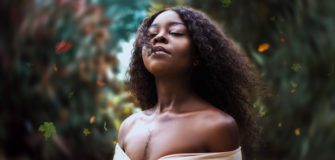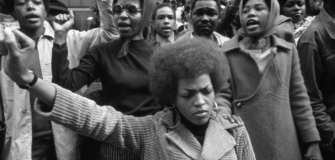The Case of the Missing Black Woman: Fashion and Beauty Images that Do Not Include Us
Share
Fall NYFW 2018 has just wrapped. And while it bears celebrating that Rihanna’s Fenty x Savage fashion line had an entire line-up of ethnically diverse models of all hues, sizes, shapes and Virgil Abloh was named the first Black designer and Artistic Director to head Louis Vuitton menswear, there are still exceedingly low percentages of Black models on the runway and featured in fashion editorials. Designers and beauty houses are still promoting the idea that white beauty is the ultimate beauty ideal via their ad campaigns, straight size clothing, non-inclusive makeup lines and runway models. And even though the world is predominantly comprised of Black and Brown women who spend trillions of dollars on fashion, beauty and makeup, we are still not included in the predominant representation of beauty in the world. The general standard of beauty promoted via images on television and editorial magazines suggests that we, Black women, with kinky hair, curvy bodies, dark skin, do not exist in the world as beautiful and desirable. And, when we do see a Black woman on the pages of magazines, the message is clear: the only acceptable way to be a Black woman who is valued in mainstream society is to have lighter skin and Anglo European features ala Zendaya, Halle Berry, or Rashida Jones.
It should surprise no one, least of all Black women, that at this year’s U.S. Open, Serena Williams was subjected to vitriolic attacks of racism, misogynoir, and general disrespect on the tennis court and in these internet streets. While she is an undisputed world champion and role model, she is not the version of Black womanhood or beauty that mainstream society finds palatable — humble, petite, and/or light skinned with European features. On the contrary, Serena is “big and black”. And, that is a threat. She makes no attempt to hide or apologize for her Blackness, her strength. She takes pride in her athleticism and unparalleled professional accomplishments. Further, she has the audacity to be happy with her body and her life which makes her a lightning rod for racist memes and even more blatant discriminatory practices by the International Tennis Federation. Serena represents an image of the Black woman that society has deemed ugly, hostile, and not feminine enough. Her skin is dark, her muscles prominent, and she is unapologetic about her success and her Blackness.
In recent years, a new wave of Black feminism has come to prominence: Black women doing it for ourselves. We are no longer waiting for mainstream society to acknowledge or validate our beauty or meet our needs. Instead, we, Black women, are creating our own products and beauty lines. We are writing our own stories. We are teaching each other how to “Glow up!” Renowned makeup artist, Pat McGrath of Pat McGrath Labs, has created an eponymous makeup line valued at $1 billion dollars. Nubian Skin, founded by a Black woman, has created an entire line of lingerie and hosiery that focuses on “nude” tones for Black women in a range of darker berry and brown colors. Rihanna’s Fenty makeup line hit stores 1 year ago to record sales because she had the foresight to include over 40 shades of foundation for Black women ranging from albinism to the deepest of African skin tones. We are proving, socially and financially, that this is our time to shine. With technology and social media, we have the means to create and elevate our own beauty and patronize the products made by us, for us.
The cumulative effect of celebrating our own beauty: empowerment. We are empowered to love ourselves and our “sistren”. I have cultivated my daily Instagram feed to celebrate the accomplishments and insights of Black women who inspire me: Bozoma St. John, Jessamyn, Slick Woods, Duckie Thot, Luvvie Ajayi, Issa Rae, Arlan Washere, Kamala Harris, Shonda Rhimes, Stacy Abrams, Lena Waithe. It reminds me that in spite of the historical attempts to erase our beauty and accomplishments, we are resilient, creative, indomitable and worthy.
Seeing women who look like me, who are dominating their careers, making art and fashion that celebrate me, writing characters that reflect my experiences, living and loving in bodies that look like mine, affirms my own worth and beauty in the world — thereby giving me permission to take up space unapologetically. As Black women we are creating safe spaces for ourselves and engaging each other in much needed sistah-to-sistah conversations around our mental health, sexuality, body ownership, the dangers of white feminism that co-opts the struggles of Black women for publicity and daily acts of self-love. It turns out Glinda the Good Witch was right–[we] had the power all along.




Follow Us